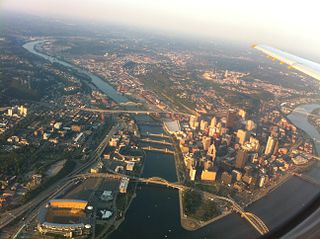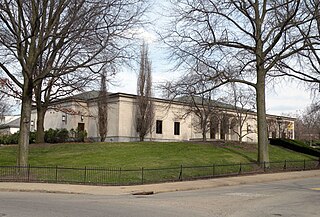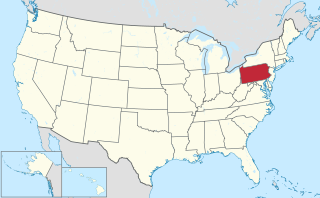The Koch family foundations are a group of charitable foundations in the United States associated with the family of Fred C. Koch. The most prominent of these are the Charles Koch Foundation and the David H. Koch Charitable Foundation, created by Charles Koch and David Koch, two sons of Fred C. Koch who own the majority of Koch Industries, an oil, gas, paper, and chemical conglomerate which is the US's second-largest privately held company. Charles' and David's foundations have provided millions of dollars to a variety of organizations, including libertarian and conservative think tanks. Areas of funding include think tanks, political advocacy, climate change skepticism, higher education scholarships, cancer research, arts, and science.
Richard Mellon Scaife was an American billionaire, a principal heir to the Mellon banking, oil, and aluminum fortune, and the owner and publisher of the Pittsburgh Tribune-Review. In 2005, Scaife was number 238 on the Forbes 400, with a personal fortune of $1.2 billion. By 2013, Scaife had dropped to number 371 on the listing, with a personal fortune of $1.4 billion.

The Hill District is a grouping of historically African American neighborhoods in the City of Pittsburgh, Pennsylvania. Beginning in the years leading up to World War I "the Hill" was the cultural center of black life in the city and a major center of jazz. Despite its cultural and economic vibrancy, in the mid-1950s a substantial area was slated for redevelopment, displacing about 8,000 individuals and leading to the neighborhood's dramatic economic decline.

The Carnegie Library of Pittsburgh is the public library system in Pittsburgh, Pennsylvania. Its main branch is located in the Oakland neighborhood of Pittsburgh, and it has 19 branch locations throughout the city. Like hundreds of other Carnegie libraries, the construction of the main library, which opened in 1895, and several neighborhood branches, was funded by industrialist Andrew Carnegie. The Pittsburgh area holds the distinction of housing the first branches in the United States.
The Art Institutes are a collection of for-profit art schools that are owned by Education Principle Foundation and the remnants of two failed parent companies: for-profit college operator Education Management Corporation (EDMC) and Dream Center Education Holdings (DCEH).

East Liberty is a neighborhood in Pittsburgh, Pennsylvania's East End. It is bordered by Highland Park, Morningside, Stanton Heights, Garfield, Friendship, Shadyside and Larimer, and is represented on Pittsburgh City Council by Councilwoman Deborah Gross and Rev. Ricky Burgess. One of the most notable features in the East Liberty skyline is the East Liberty Presbyterian Church, which is an area landmark.

The Greater Pittsburgh Region is a populous region in the United States which is named for its largest city and economic center, Pittsburgh, Pennsylvania. There are several official and unofficial boundary definitions which may be used to describe this region. In the most restrictive definition, the region encompasses Pittsburgh's urban core county, Allegheny, and six nearby Pennsylvania counties.

The Art Institute of Pittsburgh (AIP) was a private college in Pittsburgh, Pennsylvania. Shortly before closing in 2019, it was purchased by Dream Center Education Holdings (DCEH), LLC. It was located in Pittsburgh, Pennsylvania, and emphasized design education and career preparation for the creative job market. It was founded in 1921 and closed in 2019.

Richard King Mellon, commonly known as R.K., was an American financier, general, and philanthropist from the Pittsburgh suburb of Ligonier, Pennsylvania.

The Frick Pittsburgh is a cluster of museums and historical buildings located in Pittsburgh, Pennsylvania, United States and formed around the Frick family's nineteenth-century residence known as "Clayton". It focuses on the interpretation of the life and times of Henry Clay Frick (1849–1919), industrialist and art collector.

The Pittsburgh Cultural Trust (PCT) is a nonprofit arts organization formed in 1984 to promote economic and cultural development in Downtown Pittsburgh. The "Trust" has focused its work on a 14-square block section called the Cultural District, which comprises numerous entertainment and cultural venues, restaurants, and residential buildings. All together, the organization claims to oversee more than one million square feet of real estate, including commercial and residential buildings, making it one of the largest landowners downtown. In recent years the organization has had a contentious relationship with the city of Pittsburgh concerning the tax status for many of its properties, resulting in a case being heard by the state Supreme Court in 2011.

ToonSeum: Pittsburgh Museum of Cartoon Art is a museum devoted exclusively to the cartoon arts, located in Pittsburgh, Pennsylvania. ToonSeum is one of three museums dedicated to cartoon art in the United States. ToonSeum moved to its own gallery space on Liberty Avenue in Pittsburgh's downtown Cultural District on November 8, 2009, aided by the Pittsburgh Cultural Trust. It is currently led by John Kelly.

Summerset at Frick Park is a residential development located in the Squirrel Hill and Swisshelm Park neighborhoods within the City of Pittsburgh and Allegheny County. This project is one of the nation's first brownfield sites to be remediated for residential purposes. The $250 million public-project began in 1997 and is the City of Pittsburgh's largest residential development since World War II. At completion, Summerset at Frick Park will have over 700 residences and its annual property tax revenue is anticipated to be in the range $5.7- 6.3 million.
The following is a timeline of the history of the city of Pittsburgh, Pennsylvania, US.

The Westin Convention Center Pittsburgh is a 26 story, hotel in Downtown Pittsburgh, with a prominent position in the area adjacent to the David L. Lawrence Convention Center and the Cultural District. The hotel is connected via an enclosed walkway to the convention center. The building is part of Liberty Center, a two building complex which also includes the Federated Tower. Liberty Center was developed and built by Liberty Center Ventures, a partnership of Forest City Enterprises and Jos. L. Muscarelle, Inc. and opened in December 1986. In August 2013, Liberty Center was sold by Forest City to Starwood Capital Group for $135 million.

Ellsworth Avenue is located in the Shadyside neighborhood of Pittsburgh, Pennsylvania. It is mostly a commercial street that has locally owned businesses, galleries, restaurants, and bars. It runs southwest-northeast, parallel to Walnut Street, another commercial street, and is bounded by Shady Avenue to the east and South Neville Street to the west. Ellsworth Avenue is one of Shadyside's three business districts, along with South Highland Avenue and Walnut Street.

Henry Lea Hillman was an American billionaire businessman, investor, civic leader, and philanthropist. He was chairman of The Hillman Company, a family office and investment company headquartered in Pittsburgh, Pennsylvania, and owned by the Hillman family. He chaired the board of trustees of Hillman Family Foundations, which manages 18 named foundations.
Alisha B. Wormsley is an interdisciplinary artist and cultural producer. Her work is about collective memory and the synchronicity of time, specifically through the stories of women of color. She states her work is "the future, and the past, and the present, simultaneously."





















